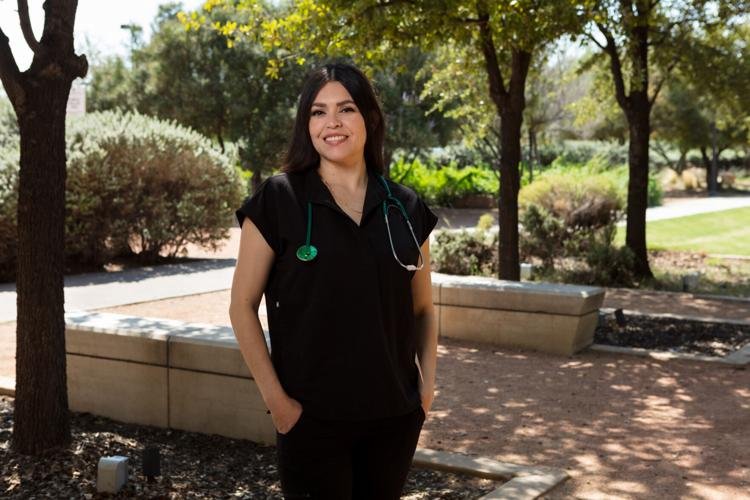Reflecting on the Pandemic
A Year-end Perspective From the Pandemic Front Line
Op-ed by Veronica Ruiz / Photo by Christ Chavez – Courtesy of El Paso Inc.
In the past two years, El Paso has been ground zero for the crises affecting America.
On Aug. 3, 2019, we suffered a mass shooting at a local Walmart. I was a nursing student doing my clinical rotation in the emergency department that morning.
With only a few of us on the unit, we got word that there was a shooting and soon several victims arrived. These weren’t typical trauma patients; they all had catastrophic, high-velocity bullet injuries.
Veronica Ruiz graduated from the Hunt School of Nursing in 2019. She is a registered nurse who worked in the COVID-19 ICU at University Medical Center of El Paso and is now a traveling nurse.
I worked alongside fellow students from Texas Tech University Health Sciences Center El Paso, and the nurses, doctors, technicians and staff who saved lives that day. We each had a role in ensuring those victims returned to their families. It changed me forever.
Nurses are prepared for the unexpected, but a pandemic soon after our community’s tragedy was something we never saw coming. In November 2020, COVID-19 hit El Paso with its full fury.
I’d graduated and was working in El Paso, where daily cases surged to over 1,800 and deaths to over 30. On Nov. 10, refrigerated morgue trailers arrived in hospital parking lots. Soon, the city was lined with them.
My fellow health care professionals worked to exhaustion to stem the waves of death. We’ve lost more than 3,000 of our community members to COVID-19 and still haven’t reached the end.
Experiences throughout the pandemic have changed health care workers: the stifling heat under layers of personal protective equipment, our fears of contracting the disease, a patient’s last moment with family as they said goodbye through an iPad screen.
Yet a year later, El Paso is an example of what’s making America work. Our vaccination rate is the highest of any major city in Texas, and we’re dispersing vaccines to places that need it desperately. Students from my alma mater, the Hunt School of Nursing, traveled to Tornillo, Texas, to vaccinate maquiladora workers from Juárez. They administered 4,200 vaccines in one day alone.
Through gun violence and COVID-19, we’ve seen death in El Paso. These things don’t see or respect borders, and they kill our region’s people in higher numbers than in other places. Together, we’re doing something about it.
Since the Hunt School of Nursing opened 10 years ago, the nursing shortage in this city has been cut in half. Most of our graduates practice in El Paso, though some relocate to their hometowns or travel, helping where they’re needed. My experiences on Aug. 3 and as a crisis ICU nurse during the pandemic have inspired me to share what I’ve learned.
El Pasoans recovered from the shooting by banding together. The T-shirt we wear in remembrance says “El Paso Strong,” which we are.
The city has also weathered a series of border crises. We helped new migrants with food and medicine, then welcomed some to stay. Today, Afghan refugees are housed at the Fort Bliss military base. I have no doubt they’ll be embraced by our city as so many generations of Americans have before them.
It’s important to realize that in 10 years, the rest of Texas will look like us. In 50 years, America will look like us. Predominantly Hispanic, hard-working, family-oriented, but vulnerable to conditions already rampant in America: diabetes, heart disease, stroke. As our researchers and doctors at TTUHSC El Paso work to solve these problems, they’re making the future of our country better.
Soon enough, we will be America. For now, El Paso is a poster child – resilient, diverse, arm-in-arm in the face of whatever comes, but looking always toward our future.
Veronica Ruiz graduated from the Hunt School of Nursing in 2019. She is a registered nurse who worked in the COVID-19 ICU at University Medical Center of El Paso and is now a traveling nurse.

